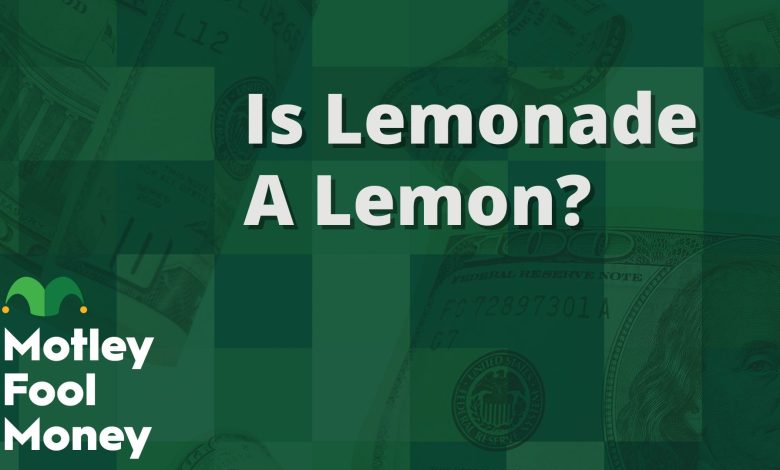EV Slowdown: Trend or Blip?

[ad_1]
We also dig in on whether insurance tech company Lemonade is a lemon.
In this podcast, Motley Fool analyst Yasser El-Shimy and host Deidre Woollard discuss:
- Why big trucks might become less popular.
- If slowing EV production makes long-term sense.
- The power demands of artificial intelligence.
Motley Fool contributor Matt Frankel and host Ricky Mulvey take a look at insurance tech company Lemonade and if it can go from sour to sweet.
To catch full episodes of all The Motley Fool’s free podcasts, check out our podcast center. To get started investing, check out our quick-start guide to investing in stocks. A full transcript follows the video.
This video was recorded on April 4, 2024.
Deidre Woollard: Is the EV market slowdown a trend or a blip? Motley Fool Money starts now.
Welcome to Motley Fool Money. I’m Deidre Woollard here with Motley Fool analyst Yasser El-Shimy. Sir Yasser, how’s your Thursday going?
Yasser El-Shimy: It’s going well so far. Thank you.
Deidre Woollard: Ricky and Jim talked Tesla deliveries earlier this week, but now we’ve got numbers from just about everybody else, or at least a lot of the big ones. We have this complicated picture of what’s happening in terms of auto sales, where the companies are going. It is really interesting and I want to dive into it. I want to start with Ford for a little bit. I mean, sales were up, but they had this 77% rise in the sale of the Ford Maverick hybrid. Overall, EV sales pretty strong, but there’s also discounting happening and there’s something else happening that you brought up, which is a migration, perhaps away from some of the big heavy trucks that have really been driving the market. I’m wondering what’s happening there. Because as the country, the U.S., we love us some trucks.
Yasser El-Shimy: That’s absolutely true. Just a few years ago, I remember when we talked about Ford, we always talked about its leadership position in the pickup truck segment, especially with the F-150 being the best-selling pickup truck in America. Now we’re talking about Ford Maverick hybrid, when discussing Ford, and that’s quite a shift. But just to put a bow on this, I don’t know if you’ve been on the market for a car lately, either new or used, but cars are becoming increasingly unaffordable. They can set you back a fifth more than they did about five years ago. That trend has not shown any signs of reversing. The pace of increasing has definitely come down. But we’re not seeing the retrenchment of car prices that we need to see in order for cars to become affordable again. This is made even worse by the fact that interest rates are a lot higher than they used to be just a few years ago. That makes car affordability absolutely difficult for people. If I’m on the car market and I’m trying to decide which car to buy here, I want to buy a smaller car that’s going to cost me less money. I want it to be a little bit gas efficient, economical, because I don’t want to spend a lot of money at the gas station. Guess what? Gas prices are also up. I may not really want to be buying an EV because EVs are a lot more expensive than the traditional ICE vehicles are, internal combustion engine vehicles. They are more expensive. There is not really a lot of charging infrastructure out there. People have range anxiety. People who could be in the Midwest or in some of the tougher climates out there, may have some concerns about their cars in the winter specifically. People are looking for that sweet spot that combines good mileage, it’s lower-price and smaller cars that may have a hybrid option, those are hitting the sweet spot for a lot of car buyers.
Deidre Woollard: This is so funny to me because for the last couple of years it’s been the death of the sedan. The major car makers have discontinued so many of those models. Now they’re like, no, wait, we like these. It makes sense because we’re seeing a rise in loan delinquencies too. But Ford recently announced that they’re pumping the brakes a little bit on the EVs because the hybrids are selling better and we’ve heard about this before with battery plants being delayed or scaled back. There’s definitely something happening here, isn’t there?
Yasser El-Shimy: Absolutely. I think automakers who have invested in hybrid technology, and that can be the traditional hybrid that we can think of like a Toyota Prius, where it’s just generative breaking, generates power to the battery and so on, or the plug-in hybrid, which has a more recent invention. Those companies that have made these investments can now stand to reap the rewards, and Ford and Toyota are at the forefront of that trend with prior investments they have made. Other car companies, on the other hand, that had made a lot of investments in transitioning all-in on EVs may be caught out here. They have the wrong mix for the wrong market, and they may struggle as a result. As optimistic as that may sound here about where Ford might be, I think there’s a word of caution which is that I don’t know Ford might be overreaching into the moment that we are currently going through by delaying the roll-out of its electric vehicles. We just read about the signature electric pickup truck, I think code-named T3, that Ford is going to roll out. That has been delayed until 2027 instead of being released in 2025. I wonder if that’s going to create an opening for competitors like a Ram, for example, which has been running a close second or head-to-head with Ford and some of these pickup trucks to take a lead in this market especially as it unveils a new-generation of plug-in hybrids, all-electric pickups. I think they’re called the Ram revolution. They’re going to release those later this year. I just wonder what reception the market will give them.
Deidre Woollard: I want to talk about one that we don’t talk a lot about. We talk about Tesla, we talk about the big three, but we had a report from Volvo. We don’t really think about Volvo that much these days, but they had pretty strong sales. Year-on-year electric sales in Europe up 22%, up 34% in March alone. But they’re having trouble selling in China, which I thought was interesting because they’re majority-owned by a Chinese company, Geely. With Volvo rather, they said they’re going to be fully electric by 2030. They announced that in 2021, they haven’t walked it back, but do you think it’s possible that they would?
Yasser El-Shimy: I think it’s possible. I don’t know that that again, would be very prudent. Look, I think Volvo is in a better position than some of their American counterparts perhaps. That’s maybe because a lot of their production is sold in Europe. Around half of Volvo car sales are in Sweden, the UK, Germany, and other European countries. These countries have made huge investments in building out that networking infrastructure I was talking about. They also enjoy population density around cities in a way that the United States doesn’t really have that. It’s a bit of a tougher task to build out that infrastructure to cover the entire country. Volvo is catering to that market. They have good reception in that market to their EV options. But trying to predict whether these trends will continue into 2030, and therefore Volvo should shift all of its production into EVs can be a bit tricky to predict at this point. I think if I were Volvo’s CEO, which I’m not, I would probably try and not put all my eggs into that EV baskets. The U.S. market is the second biggest market for Volvo. Again, I don’t know that by 2030, EV adoption is going to be that massive across the U.S. to the point where Volvo can just afford to only sell EVs and not offer any alternatives.
Deidre Woollard: I want to switch us over to talking a little bit about electricity from a different angle because you and I were talking yesterday about data centers and energy usage. I was at this conference this week called RETCON, which is Real Estate Technology Conference. They were talking about office real estate, of course. Everything was coming about to data centers like, we’ll put data centers in these old office buildings. The more I started to think about that and the more I heard people talk about the power grid and the strain that’s happening here, this is fascinating to me as something that is starting to happen and is only going to get bigger. I’m wondering how to think about it both as a person who maybe share a power grid with these data centers as well as an investor.
Yasser El-Shimy: Let’s just say I’m so glad that we installed solar panels late last year. I think utility bills are going through the roof, most likely over the next 10 years or so. The demand that these data centers are going to create on the electricity grid and the power grid across much of the world is going to be very, very significant. Already we had a secular growth market for data centers. Keep in mind data centers right now already consume almost 1%-2% of the entire global power production. When we have this generative AI revolution in the works, where you are going to have to have data centers dedicated to training large language models, they come with extreme power requirements. They are going to consume even more power than the traditional data centers that are already consuming so much of our power. Energy is really the 800-pound gorilla in the room with the whole generative AI discussion.
Constellation Energy, for example, which is a utility company here in my home state of Maryland, they’re projecting that data center electricity consumption is going to almost quadruple over the next six years compared to 2022 levels. The question that investors and even policymakers should really be asking is, where will this power come from? From an investing perspective, I’m really interested in two sides here. First the power generation side, and second the power savings side. Power generation, we can look at utility companies, especially operating in areas with heavy concentration of data centers, such as Northern Virginia, for example. You can also look at alternative energy options that stand to benefit from this energy bonanza, if you will, including solar, wind, and definitely nuclear companies. That’s from the power generation side. On the power saving side, we’re going to actually have to look at companies that make the computational chips, as well as the storage devices that are used in these data centers to make some new innovations in their power consumption so that they can actually reduce the power requirements to operate these things in a significant way. We’re already starting to see the likes of Nvidia even announcing that their next generation of chips are going to require a lot less electricity than is currently the case with the H100 and H200 generations. Also on the storage side we can see companies like Pure Storage really innovating on this front and offering very compelling low-power storage device options for data centers.
Deidre Woollard: It’s fascinating. One of the things I’m thinking about too is, if these prices go up, that’s not great for me as someone who’s sharing the power grid. But then I also think about how these companies make all of this pay. You shared with me this story from the Financial Times about Google maybe putting some of its AI powered services behind a paywall. We have to pay for all this computational power somehow. I think all of these companies are really trying to figure things out. It’s fascinating what’s happening with Google and if AI becomes such and one of the things I’ve heard is like an awareness of the fact that if I’m searching something on Google versus searching something on an OpenAI or Gemini or anything else, I’m using a lot more power if I’m using AI and that power has to be paid for somehow. What is Alphabet looking at with this?
Yasser El-Shimy: I think you make a very good point. To run a search query on a ChatGPT, or on any other generative AI model requires a lot more power. Therefore a lot more cost to run that query compared to the traditional online search model that Alphabet has championed through Google, where you just type in whatever question you have and they have an algorithm and the works that’s already stored there and based on keywords, they throw at you a lot of blue links littered with ads. You just have to navigate your way through that in order to find what you’re looking for. My sense is that this era of search is going to change and change rapidly. I think people are going to be a lot more interested in actually getting answers to their search queries as opposed to a lot of blue links. That’s a huge problem for Google and Alphabet, of course. This is like the mothership of innovator dilemmas here. You are being disrupted with the generative AI models like Claude and ChatGPT. Now, Alphabet has a choice. It can either double down on its traditional search and say, you know what, this is our bread and butter, we’re going to keep it going. It has insanely high profitable margins, and we’re just going to keep it going. Or it can try and compete with the likes of ChatGPT and Claude and offer its own generative AI model code-named Gemini, at this point. They’ve already gone through so many different names of what their AI model is going to be. But the point is, it’s a very tough choice to make because by offering GenAI search options to their customers, Google’s, in fact, enabling that very trend which is disrupting them. Of course, they can only succeed in one of two things here. They can only try and maintain their market share in search, and that is again going to be through offering these GenAI models that customers are increasingly demanding. But the downside to that is that that is going to come at the expense of their margins. They cannot continue to be as profitable as they have been, or maintain the same market share that they have been. One or the other is going to have to be sacrificed here, and that’s, I think, probably the reason why we’re hearing the news about Alphabet trying to offer a subscription or Gemini in order to maybe like teeth out a new business model. I think competition is going to be strong. I’m skeptical that Alphabet is going to be able to work it out in terms of maintaining market share as it has traditionally been, and maintaining profit margins to be as high as they had traditionally been.
Deidre Woollard: No matter what happens, we’re going to need a lot more power. Thanks for your time today.
Yasser El-Shimy: You’re very welcome. Happy to be here.
Think you know Disney Plus? You’re missing half the story because we have lots for grown-ups only, which is why Disney Plus has parental controls so the kids don’t see the [sound] in epic dramas like FX’s Shogun, the [sound] in acclaimed shows like FX’s The Bear, or the [sound] in award-winning movies like Poor Things. “You must go punch that baby.” Grown-up shows you love, with parental controls you can trust. All these and more, now streaming on Disney Plus. Eighteen plus subscription required. Ts and Cs apply.
Deidre Woollard: Is Lemonade, the insurance tech company, a lemon? My colleague Ricky Mulvey caught up with Motley Fool contributor Matt Frankel for a check-in on the company and what it would take for Lemonade to turn around?
Ricky Mulvey: All right Matt, Bill D, wrote to us at our email [email protected]. That is podcasts with an s @fool.com. Can one of the episodes give a deep dive/review on Lemonade sometime soon? I know there are probably a fair number of Fool members holding this in wondering whether/when to get out. I’m one of those members Bill, so I am more than happy to do this segment with Matt Frankel who follows this company closely but for those who are less familiar, I want to give some setup. Lemonade is an insurance tech company that aims to disrupt traditional insurance by using an AI platform to give better “faster claim payouts.” It builds a customer-based through renter’s insurance and was looking to expand from there. The other side is that there’s a charitable component where the stuff they don’t pay out goes to charity, but for a lot of the Fool members listening, what they know is that the share price went from about 160 bucks in 2021 to about 16 bucks today. Matt, let’s start in 2021, what were the expectations for Lemonade at that point?
Matt Frankel: Lemonade IPO was completed during the meme stock craze. That’s just some context there when everything was just going up, up, and up and their valuations, looking back in retrospect, they were not accurate but generally the business has done what it was supposed to. I’m sure we’ll dig into that in a little bit but the story is great, that’s what really attracted investors. You mentioned the charitable component, I love what they’re trying to do. Buying insurance is clunky at best, the claims process is really clunky with most insurers and Lemonade aims to solve that and has solved that with its products. Customer satisfaction is just off the charts good and they’re growing the business pretty rapidly but if you compare the numbers now to the numbers then.
Ricky Mulvey: The story is we’re gonna get younger folks in the door with I would say a softer, more relevant marketing pitch. Get them with renter’s insurance and from there we’ll sell them car insurance, homeowners insurance, pet insurance, which they have a partnership with Chewy for. I know we don’t like to start with the stock, but how is the stock story changed over the past few years then, why have so many people soured on Lemonade?
Matt Frankel: Well, as you mentioned, I like the joke soured right there.
Ricky Mulvey: Here you go.
Matt Frankel: But, as you mentioned, the stock is down roughly 90% from the 2021 peak. Again, in retrospect, it never should have been 160 or $180 stock or wherever it ended up peaking. You can look back at all a lot of the companies that went public during that time and make a different valuation case than the one that was being made at the time. But the stock story, people are souring on the company one because it’s taking longer than expected for Lemonade to become profitable. That’s a big one. If you think of what was happening in 2021 when you could essentially borrow money for free Lemonade did at one point. One of the smartest moves day ever made was they issued about a billion dollars of new debt at the peak and at $160 stock valuation and essentially pay no interest on it, but now the worry is that they’re going to run out of money before they’re profitable. This is not the type of environment a unproven insurance start-up wants to be raising money in. That’s really the biggest issue why people have soured on it.
Ricky Mulvey: Running out of money would be a significant problem. CEO Daniel Schreiber has said, I think in the last quarterly earnings that they expect to be cash flow profitable this year. There’s a business behind this stock though, and it’s improving its loss ratio. It’s writing more premiums. Is it that race to run out of money? Is there something else going on? It seems to be on track to at least become cash flow profitable. If you listen to management.
Matt Frankel: Well, so here’s, here’s the numbers. They have about $945 million in cash and equivalents on their balance sheet. They can’t use all of it, insurance companies need to have reserves and things like that, but the management says that they’re going to have positive cash flow by late 2025 is the latest quote and I’d be adjusted EBITDA profitable, not even real EBITDA profitable by 2026. It’s a little bit of a gap they have to bridge and you’re right, their loss ratio is improving, It’s still not where it needs to be. In the fourth-quarter look, it was 77% as opposed to a 75% target. The first and fourth quarters of every year, are seasonally strong time for insurance. Generally, the big natural disasters happened in the summer. It’s a seasonally strong time, so definitely watched the second and third quarter. I don’t think it’s gonna be 77% for the year. If it was, that would be a very big accomplishment but that’s really what investors are looking at.
Ricky Mulvey: There is seasonality to watch. I want to get into basically two other significant I would say bear takes on the company. One I’ve heard that I don’t quite understand so I’m asking you is that the company has to buy reinsurance for a large portion of its policy exposure. It can’t essentially cover the claims that it’s paying out. I know a lot of insurance by reinsurance, but is this is this uncommon for a consumer insurance company? Like how should us regular investors understand this component of the business?
Matt Frankel: Think of reinsurance as insurance for insurance companies and you’re right, most insurance companies use this. This is how, say, if a homeowner’s insurance company wants to limit its exposure to hurricane losses. It might buy a reinsurance policy that caps it’s own out-of-pocket losses, let’s say a billion dollars and then the reinsurance policy would kick in and pay the rest. It’s not usual for a company to essentially exclusively or almost exclusively rely on reinsurance. I think it’s 75% of the premiums lemonade takes in, go right to pay reinsurance. It’s kind of a central part of the business model, which makes it a more of a capital light business, more of a predictable cash flow business but you’re right, it’s not as common to be that reliant on reinsurance policies.
Ricky Mulvey: Would you like to see Lemonade do more of its own underwriting then? If it’s a tech company, you don’t want to have a ton of that on the balance sheet but if you’re an insurance company, you sure do a lot of underwriting.
Matt Frankel: Well, if with their reinsurance strategy they can hit that 75% target sustainably, then I’m fine with the way they’re doing things right now, but they’re not. If you remember about two-year, this was speaking at 2021, you had the big Texas freeze. That was the kind of the big event in 2021 and it shot their loss ratio up to something like 120% in the fourth quarter. That’s not good, it doesn’t matter how much better you make the insurance process. If you’re not good at underwriting, what are you doing? That’s really the big concern. It’s trending in the right direction. The reliance on reinsurance could end up being a bit of an issue but the biggest reason, their loss ratios are still so high, just for context, is since that time they’ve rolled out a lot of new insurance products. They have life insurance now they have car insurance, they’re not just a renter’s insurance company. Homeowners insurance has become a much bigger part of the business and it’s these newer types of insurance that are responsible for the elevated loss ratio as they’re letting these kinda cohorts have insurance customers season. It remains to be seen if they can make it a profitable business model long-term.
Ricky Mulvey: Even if it becomes profitable, a lot of those earnings might be spread out and I understand why companies need to issue new shares, new equity, in the case of Lemonade, though their average shares outstanding have about doubled since 2020 according to looking at stock data.fool.com but what should investors make of this? Should they expect sort of that issuance to be pulled back, as this company becomes a little more mature?
Matt Frankel: Well, to be fair, some of that doubling was the IPO itself. Some of the doubling was as secondary offer they made when the stock was through the roof, which was a great move but a lot of it is stock-based compensation, which from an investor standpoint, one of my biggest complaints with Lemonade’s business model is their stock-based compensation seems ridiculous. In 2024, they’re expecting about $60 million of stock-based compensation. This is for a company whose total market caps is about a billion dollars and it’s not profitable. If you want to reward stock-based compensation because your employees are making money for you? Great, but you can’t dilute the stock by 6-10% a year with stock-based compensation long-term, and expect to deliver market-beating returns for investors. You just can’t.
Ricky Mulvey: I guess for those holding onto it, what are you looking for in Lemonade’s results for this year, or at least the first three quarters?
Matt Frankel: I already mentioned the seasonality is making the fourth quarter numbers that we just got look good. I’m gonna be watching during the summer season the second and third quarters for their underwriting results, see if that loss ratio continues to trend downward even in a Nazi’s, the belief favorable time. They’re not gonna get the stock-based compensation under control this year, unfortunately, but I want to see that their adjusted EBITDA loss and their cash flows trending toward those targets that get cash flow positive in 2025, adjusted EBITDA profitable in 2026. If they’re heading in those directions, that’s a good thing and the stock could look like a bargain at these levels but if not, it’s gonna be a pretty binary outcome I think.
Ricky Mulvey: Let’s answer Bill’s question, right now, the stocks are beaten down, there’s some things to watch. Are you selling? Are you adding while it’s beaten down? Are you holding to see how the story plays out?
Matt Frankel: I am holding, I am in wait-and-see mode. I’ve kind of like a lot of investors have a lot less appetite for speculation than I did in 2021 and 2022. Understandably so, but I love the management, I love the idea, I just wanted to see some execution and if we start seeing that in the next couple of quarters, I might be a buyer.
Ricky Mulvey: For the investors who are a little less than on the speculation or a little less eager to speculate, are there any other insurance companies, maybe more established, maybe profitable, that deserve their attention that you’re watching?
Matt Frankel: There are some good opportunities in insurance right now. My largest insurance stock in my portfolio is MetLife, ticker symbol MET, tried and true business model. They are more of a traditional insurance company, but are really good at their job and it’s a great dividend stock right now. I’ve hold that one for about 10 years and have no plans to sell.
Ricky Mulvey: Perfect. Matt Frankel, thank you for your time and your insight.
Matt Frankel: Always fun to be here.
Deidre Woollard: As always, people on the program may have interest in the stocks they talk about and the Motley Fool may have formal recommendations for or against, so don’t buy or sell stocks based solely on what you hear. I’m Deidre Woollard. Thanks for listening. We’ll see you tomorrow.
[ad_2]




